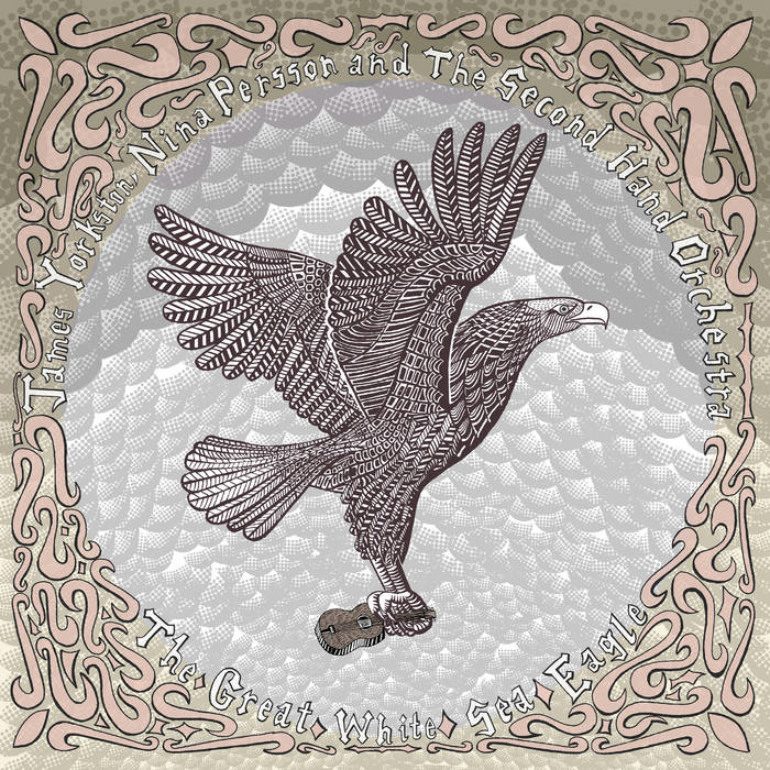

Twee rockers enchanted by parenthood
The Great White Sea Eagle by Scottish folk musician James Yorkston, Swedish collective the Second Hand Orchestra and new arrival Nina Persson of the Cardigans is a surprise sequel to 2021’s The Wide, Wide River. It sounds like grownups reminiscing about the good and the bad times in a cabin by the sea, with quilts over their laps and a fire roaring, speaking in whimsical tones so the children at their feet can be soothed and amused by the form of their talk and not scared by the content, which they wouldn’t understand just yet.
The record is about the generation who grew up on songs as reflective and bittersweet and concerned with the “real thing” as these suddenly discovering themselves in the same position as their parents, shaken by their mortality and the bizarre role reversal, and at the same time warmed that their children are looking to them for wisdom nevertheless.
Both Yorkston and Persson, who was brought in to shake up the songwriting—and she really does—are around fifty. They “remember when [the Clash’s] ‘London Calling’ came on the TV and we began to weep.” And now, “Here I am between my son and my father,” Yorkston sings for both of them, “and they whisper, ‘Well who put him in charge.’”
The Clash and the Velvet Underground (in “After Hours” mode) and the other poetic-realist art-rock bands this band loves have raised musicians who tell great stories within the popular song idiom—the keynote first track about leaving the world behind incorporates the phrase “up jumped the devil”—set to endearing singalongs and chamber-pop lullabies, sometimes to softly swaggering electric grooves, and even to ambient fog on the spoken-word title track which reveals the symbolism behind the the Great White Sea Eagle.
Yorkston and Persson’s vocals blend as if they’re raising a family together, perhaps no more exquisitely than on “An Upturned Crab,” which is about not getting to see your child’s formative moments because you were out on the road. They make the phrase “How unfortunate I was to have missed that” dance in the air and twirl down back down to the ground. The Second Hand Orchestra know when to hang back and merely add dabs of color to the sound portrait, and also when to come in hot and melt the frosty atmosphere. Their strings, horns and orchestral drums transition from wintry to swinging at all the right times. The slow-build sequencing of the tracks makes good use of their range.
Though the record is precious and tear-jerking, it’s sincere and level-headed, not manipulative. “The Heavy Lyric Police” shows the band’s unpretentious perspective without taking any of emotion away from the more serious songs. It starts with what sounds like Yorkston addressing someone in the studio, saying “You okay, Daniel? I still like this God,” which whether or not those are really his words, captures the album’s mix of solicitousness and casual profundity. The track is just the right amount of tongue-in-cheek, recognizing that while these sweet songs pack forbidding themes, it’s only art, the magical receptacle for dark feelings that frees us up to live actual life: “Now I’m doing fine I assure. But I still think of those times and I tell you I have visits from the heavy lyric police.”
The Great White Sea Eagle is as vivid, human and moving as a great indie film. Simpler songs tend to do drama at the surface level: “I feel wistful.” But these songs treat such experiences holistically: “So this is kind of what it feels like to feel wistful? Huh. Might be a song in there somewhere.” The members are comfortable jamming on the coast, at the edge of a vast mystery, under an overcast sky, because the effect these conditions have on the human imagination is wonderful. The absentee parent of “An Upturned Crab” laments, “I would have loved to see your mind working out the salty little see, discussing all the truths playing out in front of you.” Well these truths have been transmuted into a record, so they can be replayed.
